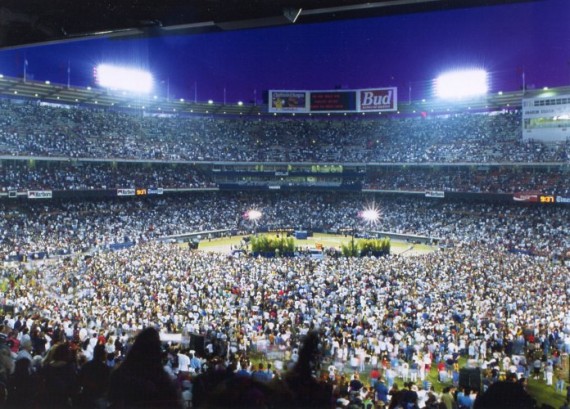There are lots of people who become Christians at Evangelism Crusades. There is no denying it. I believe that the number of conversions reaches into the millions. I have argued in previous posts that despite such numbers, personal relationships might be a better and more effective way of reaching even more people.
But there are additional problems with Crusade evangelism. The first concerns what we are teaching these new converts. When a person becomes a Christian at an Evangelistic Crusade, what is the first thing we teach them about Christianity and following Jesus? What theological ideas about God and church are we affirming?

The Gospel of Crusade Evangelism
The typical message at an Evangelistic Crusade follows this structure:
God loves you, but you are a sinner. As a sinner, you are alienated from God, and can do nothing to correct that alienation. If you continue in that state, you will suffer eternal alienation from God in everlasting hell. But God, out of His great love for us, created a way of escape from eternal punishment—you must be born again.
There is little agreement among evangelists about the method of being born again. The requirements often include raising a hand, coming forward, saying a prayer, signing a card, confessing Christ, repenting of sins, believing in Jesus, and getting baptized, which is altogether a separate issue…
Holes in the Crusade Evangelism Gospel
The message itself is not exactly wrong, it just leaves out a huge portion of the Gospel. The message is too otherworldly. It is a message about the afterlife only, about heaven and hell and what happens to us after we die. The message rarely has much application or relevance for life here on earth, unless it is some vague notion that God wants to help us with our needs if we will just pray, obey, and go to church. I understand that the evangelist can only say so much, and that the message of eternal life is the most vital, and that the ministries encourage local churches to do the follow-up discipleship.
But this is exactly the problem. When a Crusade Evangelist gets all the glamor, glitz, and glory of presenting the “Gospel” to millions of people, and the people hear a message about being born again, and then those who respond attend a church without all the glamor, glitz, and glory, and they hear a message about discipleship, following Jesus, danger, famine, persecution, and suffering, they rightfully feel that somebody is not being honest. The requirements of discipleship are not what they signed up for. And so they abandon church in droves.
The only way the church can combat this, of course, is to maintain the glamor, glitz, and glory of the crusade evangelists while at the same time, dumbing down the Gospel message and the requirements of discipleship. Many churches in recent decades have successfully accomplished this, which accounts for much of the rise of the modern megachurch movement.
Relationship Evangelism Naturally Leads to Discipleship
 Again, most of this is not an issue through relationship evangelism. When you develop a long-term friendship with someone, they see the struggles and challenges you face. They watch you deal with lost jobs, broken marriages, and moral failures. But through it all, they also observe your faith and commitment to following Jesus and serving others.
Again, most of this is not an issue through relationship evangelism. When you develop a long-term friendship with someone, they see the struggles and challenges you face. They watch you deal with lost jobs, broken marriages, and moral failures. But through it all, they also observe your faith and commitment to following Jesus and serving others.
It’s not perfect. It’s not glorious. But it’s real. There are no jumbotrons and spotlights, but there are small acts of love. There are no news headlines, but there are daily commitments to faith and hope in God, even when God doesn’t act like we think He should.
God brings people into His family in all sorts of ways, and Crusade Evangelism is one of them. But it is not the only way of evangelism, nor (in my opinion) is it even the best.




Yeah, I’m not so sure about the accuracy of this statement:
“The only way the church can combat this, of course, is to maintain the glamor, glitz, and glory of the crusade evangelists while at the same time, dumbing down the Gospel message and the requirements of discipleship. Many churches in recent decades have successfully accomplished this, which accounts for much of the rise of the modern megachurch movement.”
Megachurches have not historically been the beneficiaries of large evangelistic crusades (which have been fairly non-existent in America over the past 20 years or more, actually). I’m not sure where all those millions of new believers went, but as a former pastor at a megachurch, I can tell you we didn’t do anything to try to replicate the crusade feel.
I also think the pervasive opinion that megachurches grow by “dumbing down the gospel” is mostly the opinion of the small, dying churches in America. It’s almost as if numeric growth and size cannot ever occur without selling out or compromising the Gospel somehow (they must be giving out free beer on Sundays). The truth is, the Gospel has been very clearly and persuasively presented in every megachurch I have attended or worked at. At least the Gospel as you nutshelled it in your post, anyway.
I,too, am concerned about the Gospel being too narrowly presented. But that is the problem of the entire evangelical movement over the past 150 years or so, and not just the crusade/megachurch phenomenon.
In addition, this narrow view of a moment in time decision for Christ is necessary to be able to “count” conversions, which is the only way to measure our success as a church, organization, or Christian. We simply have no way to count disciples (when do we get to count them? What is the criteria? Baptism can’t be it, can it?).
I helped organize and lead a large “festival” in our fair city a number of years ago. They reported, after the weekend event, that 3300 new decisions for Christ were made. Of the 213 follow up cards I got at our church, only 3 indicated they had some kind of conversion experience there. The rest? Well, you’ll be happy to know that almost all of our pastors and and elders at our church made a first time decision for Christ, according to the boxes they checked. Numbers are a bit misleading, I’m afraid.
Randy,
You make a good point about the megachurches. I was trying to say that the meagchurches learned from the glamor and glitz methodology of crusade evangelism, not that the megachurches benefited from the “conversions” of crusade evangelism.
I think what you are doing there at Doable Evangelism is right on target. I love it!
Hmmm… Wasn’t there something somewhere re: someone counting his followers (or soldiers)? I believe that was preceded by the Lord instructing said leader to NOT do so (count his followers, that is)… or face certain consequences.
Hmmm…
M.
Jeremy, the “glamor, glitz and glory” is one of my concerns, not just for evangelism but for things like youth crusades, calling kids to rededicate their lives to Christ. I appreciate the excitement, and there’s something magical about thousands of voices raised together in song that’s like a pre-echo of heavenly worship. But real life isn’t glamorous.
But now my thoughts are spinning in a different direction… from the thought that “A local church simply can’t offer that same glitz.” But maybe the problem is that our local churches just aren’t dangerous enough. Glitz is thin. Alan Hirsch talks about the importance of shared danger, and the true danger of artificially safe environments.
Jon,
Great point. Glitz is thin. I have heard Hirsch talk about dangerous churches, and think he might be on to something. We need something that truly inspires and get people moving and thinking in the right direction, storming the gates of hell rather than hunkering down and waiting for the rapture to arrive.
Whatever the truth of what you say (ad I think you are correct), it is certainly true that the modern evangelical gospel, crusade or otherwise, is NOT the gospel Jesus preached. There may be good and valid reasons for the difference, but it is surely important to at least consider that fact.
Jesus’ primary message was the kingdom of God, and it is its coming on earth, announced by Jesus that was the original good news (see Mark 1:15). That kingdom was not primarily about saving our skins in the next world, but accepting the freedom Jesus was bringing into this world and being part of carrying that freedom to all people (see Luke 4:16-21). Personal forgiveness was part of that freedom, but not all. The eternal life thus begun would of course lead on to resurrection and continued eternal life in the age to come.
I have looked at this in greater detail in What message?. I think, Jeremy, you have not actually been quite radical enough in this post.
Not radical enough, huh? Ha! I trembled pressing the “publish” button! You are braver than I!
Thanks for the link to “What Message?” You are right on target with that post.
“Not radical enough, huh? “
The comment was meant to be both light-hearted and encouraging! : )
UnkleE,
Yes, I was encouraged. I was just joking around with you in return.
Dear unkleE, Amen to more radical teaching, I for one have had enough of ‘softly softly catchy monkey’ preaching. my Church drives me mad with this idea of getting them in, locking the door with the large Guilt bolt and feeding them with baby food. Over the years I have written various articles for the Church magazine which in the main have been rejected, not for their inaccuracy or their lack of truth but because “they aren’t ready for it yet”. The spirit of fear in our Churches is rampant as we try to be more acceptable to a world that is dying on it’s feet.
people wander into Church looking for answers to BIG questions we simply placate them and give them a quick shot of, “Jesus loves you” so there is no need to worry. We don’t talk about the devil in our sermons or make a big deal out of Jesus suffering on the cross, Easter is mainly about Rabbits, Chocolate Eggs, Spring flowers, new life, how lovely. People come into our Church looking for truth. Even the world outside showers us with reality TV with graphic images of death, violence and detailed extracts of how people have been mutilated. We the Church sanitize everything in the Bible we never mention the deaths that happen all through the Bible in case it puts people off God. We do like the Psalms but pick nice ones.
Why do people leave Church the C of E surveys ask. I’ll tell you why because we don’t speak the truth we do not give answers to questions and treat people like we grow Mushrooms Keep them in the dark and occasionally throw a load of crap on them.
The Church thinks that loud bands, trendy vicars, comfy seats, child minding and a cafe will bring um in, give me a break, when I first got the call, the Church then was cold, hard pews, poor lighting, a choir who thought they were Gods gift to the world, toffy nosed upper classes who looked down their noses at me and the divorced, but I didn’t care, I loved it and joined in the singing except when it was in latin. I was the last person to judge anyone and was pleased to be in a place that loved God in their own way. We had three services each Sunday I was at them all, why, because I could not get enough of the God who saved me. Every week I was in a Bible study group, I loved it. I Love Church because She is His Bride, I am part of the train that fills the Temple, I am the Bride of Christ. Jesus said build my Church. OK we have made a balls up of what it should be, but with all it’s weird rules and ways it’s different denominations, I do not care. The Roman Catholics wont allow me take Mass in their Church I do not care, I still go periodically and sill love it, why, because in spite of the idiosyncrasies we are all together, weather it be with a right or wrong heart, that does not matter, we are corporate, one body, warts and all and God Loves it. Do you think God is sat in the Church making judgments on everyone, NO He is there clapping and dancing with us and He’s not on his own he has brought a host of Angels with Him to.
Why did God send a throng of Angels to the Shepherds when He could have sent one? because it’s not good for man to be on his own, He loves community, He loves families, He loves fellowship, He love parties, banquets, weddings, funerals. Look at the Jews His chosen people, how they party. Come on lets celebrate, the Bridegroom is here.
Clive
Yes, let us celebrate! God loves community, families, fellowship, parties, banquets, weddings, and funerals. Wherever people gather. All of these, in some ways or another, are glimpses and foretastes of the Kingdom of Heaven.
Did you know that about 95% of people who respond to an alter call are already ‘saved’ but terrfied that they may have got it wrong so feel it essential to make another public confession in order that God will spare them from hell. How heart ranching is this? You are right Jeremy! Evangelism has to some degree become a fear based system rather than a tool to reveal the beauty of the kingdom that already lies within each one of us! If the crusades were to say ‘no one need put their hand up or confess anything! There is nothing you have done either good or bad that is of interest, what matters is this; you are loved, accepted and forgiven just as you are…all you need to do is quietly allow your mind to accept that the creator of this universe is wild about you!’ ….if we took this approach it is likely that crusades would no longer be crusades because there is nothing left for the people to do in order to gain the approval of the father. 🙂 hope this makes sense !
We are officially inviting you to come to Zambia and Angola to conduct massive gospel crusades. Your coming to these nations will bring to save multitudes and multitudes of lost souls to our Lord Jesus Christ.
We are looking forward to hearing from you. May the good Lord bless you abundantly.